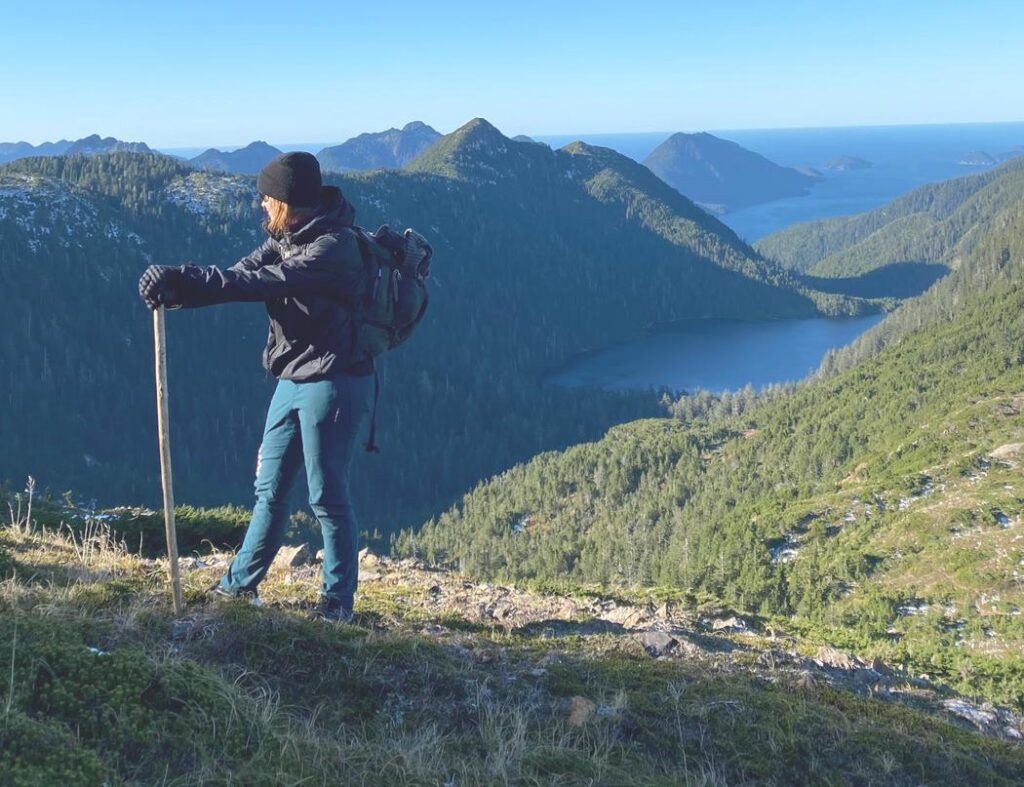By Mabel Moses
Vashon-born and raised, Mabel Moses spent a semester on Haida Gwaii, an archipelago in BC briefly called the Queen Charlotte Islands on colonial maps. Upon graduating from the University of British Columbia’s Faculty of Forestry, Mabel chose to live on Haida Gwaii. Here in Part 3, we hear directly from Mabel. Enjoy! Read Parts 1 and 2 at vashonloop.com.
I came to Haida Gwaii with the intention of learning “how to do things better” or “the right way,” with the assumption that this was a concrete thing I could learn and gain. Because I knew that here in Haida Gwaii, forestry regulations protected more ecological and cultural values than they do elsewhere in BC. The Haida have more decision-making power than Indigenous Nations do elsewhere.
After a year of being here, it’s hard to put what I’ve learned into words. As I’ve let myself settle and feel more committed to being here, I’ve noticed more of a shift in the way I see myself and the way I act.
I was drawn to move here more permanently because of the community. Back then, I thought of the community here in more concrete terms: as a collection of people living in a relatively isolated place who rely on one another. It felt to me a bit like Vashon felt growing up, but with even more interesting people and acceptance for my own weirdness, and more self-sufficiency.
Now I could probably say I have community here. But what I’ve realized is that I was looking for “community” as something that was a noun. Now when I think of community, it doesn’t seem so concrete. Instead, I feel I interact with community more like a verb. I often find myself thinking that someone I know needs a ride somewhere, someone I know would really appreciate these tomatoes I just grew or deer I just butchered. I’ve found that when others need something, suddenly it’s just this attitude of, “Well, I guess this is what needs to be done right now.”
The city and University felt so competitive and isolated to me. Everyone working on their own degrees, for their own futures. Trying to figure out who they are. I think this is important, and I do value the individualism of it all. And I’ve moved up here too to pursue my own individualistic goals. But under it all, there seems to be a baseline of not having enough.
The culture here is less transactional than anywhere I’ve been. People give and give. So much food is constantly circulating. It comes from friends, neighbors, the band council, potlatches. Any time I’ve been here without a place to stay, so many people have offered to host me. People just give, whether they know you or not. At first, this made me uncomfortable because I felt I was indebted, I tried to give back, food for food, time for time. But now I have started to become more comfortable taking. Accepting all the gifts that are given here. I’m noticing more and more that I don’t think twice about giving something when I have it.
Here, I am living life much more from the bottom up. I have trust that there are people in power who do care for the land and community, so then my day-to-day is filled with purpose, being part of what is going on. Foraging, fishing, hunting. Don’t get me wrong, I don’t think this place is some paradise free from greed or corruption, it’s not. I don’t want to pretend I’ve found “perfect” and judge everywhere else. But I didn’t realize how much all the resource extraction and competitiveness and politics of western culture was weighing on me.
I am hesitant to use big buzzwords like capitalism. However, in a real sense I feel like I may be experiencing a culture that is built on something different than the capitalism I grew up with, from the very ground up. Here, it seems people just give for the act of giving. As I’ve been told many times, wealth in Haida culture is measured by how much you are able to give away, not how much you hold onto. And I think that culture has seeped into the whole island community here.
I want to say that Vashon has some of this culture and potential too – I know there are pockets of people who give so much. For me, however, there was such an overshadowing of the politics of the US and all the problems of the world. It’s been nice to escape for awhile.
But here on Haida Gwaii, the Haida and locals have fought against colonialism, resource extraction, so many “evils.” And underlying it all, I think it’s this culture of giving, appreciating the little things, and doing all the little things for each other that makes this place work and succeed. Putting energy into what is right, accepting and giving to people no matter what you think of them, instead of getting caught up on Facebook drama about what is wrong. It starts with that.
I want to keep thinking about this, and want to keep the conversation alive. From one island to another.

